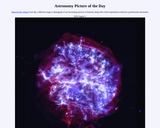7302 Results
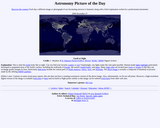
NASA Astronomy Photo of the Day website hosted this photo of Earth at night in November 2000. The photo shows what Earth looks like at night with urban centers highlighted by concentrations of city lights. The image is a composite of hundreds of satellite photographs taken by orbiting Defense Meteorological Satellites Program satellites.

In this activity, students calculate the average distance of each planet from the Sun scaled to a football field drawn and measured out on a 30 x 35 cm paper.
- Subject:
- Science
- Material Type:
- Unit of Study
- Provider:
- European Space Agency
- Date Added:
- 03/30/2018

This Readers Theater script includes parts for 8-9 students. It is based on the Feature Story, At Home in the Cold and discusses various adaptations that allow animals to survive in the cold oceans of the Arctic and Antarctica. The script was written for students in grades 4-5.
- Subject:
- Science
- Material Type:
- Reading
- Provider:
- Ohio State University College of Education and Human Ecology
- Provider Set:
- Beyond Penguins and Polar Bears: An Online Magazine for K-5 Teachers
- Author:
- Jessica Fries-Gaither
- Nicole Luthy
- Date Added:
- 12/17/2009
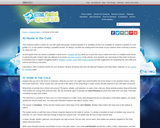
This article reprints and links to informational text about the adaptations that allow mammals and fish to survive in polar oceans. Versions are available for students in grades K-1, 2-3 and 4-5. Related science and literacy activities are included.
- Subject:
- Science
- Material Type:
- Lesson Plan
- Provider:
- Ohio State University College of Education and Human Ecology
- Provider Set:
- Beyond Penguins and Polar Bears: An Online Magazine for K-5 Teachers
- Author:
- Stephen Whitt
- Date Added:
- 07/30/2019

This script for choral reading was written to be used with two groups of students. The script is based on the Feature Story, At Home in the Cold and discusses various adaptations that allow animals to survive in the cold oceans of the Arctic and Antarctica. The script is appropriate for use with students in grades K-1.
- Subject:
- Science
- Material Type:
- Reading
- Provider:
- Ohio State University College of Education and Human Ecology
- Provider Set:
- Beyond Penguins and Polar Bears: An Online Magazine for K-5 Teachers
- Author:
- Jessica Fries-Gaither
- Nicole Luthy
- Date Added:
- 12/17/2009

This informational text explore adaptations that allow penguins, whales, walruses, seals, and fish to live in the cold water of the Arctic and Southern Oceans. The text is at a reading level appropriate for second through third grade. This version is a full-color pdf file that can be printed, cut, and folded to form a book. Each book contains color photographs and illustrations.
- Subject:
- Science
- Material Type:
- Diagram/Illustration
- Provider:
- Ohio State University College of Education and Human Ecology
- Provider Set:
- Beyond Penguins and Polar Bears: An Online Magazine for K-5 Teachers
- Author:
- Jessica Fries-Gaither
- Date Added:
- 12/17/2009

This informational text explores adaptations that allow penguins, whales, walruses, seals, and fish to live in the cold water of the Arctic and Southern Oceans. The text is at reading level appropriate for students in second through third grade. It is a PDF file that contains text as well as a glossary.
- Subject:
- Science
- Material Type:
- Reading
- Provider:
- Ohio State University College of Education and Human Ecology
- Provider Set:
- Beyond Penguins and Polar Bears: An Online Magazine for K-5 Teachers
- Author:
- Jessica Fries-Gaither
- Date Added:
- 12/17/2009

This informational text explores adaptations that allow penguins, whales, walruses, seals, and fish to live in the cold water of the Arctic and Southern Oceans. The text is at reading level appropriate for students in fourth through fifth grade. It is a PDF file that contains the text as well as a glossary.
- Subject:
- Science
- Material Type:
- Reading
- Provider:
- Ohio State University College of Education and Human Ecology
- Provider Set:
- Beyond Penguins and Polar Bears: An Online Magazine for K-5 Teachers
- Author:
- Stephen Whitt
- Date Added:
- 12/17/2009

This informational text explores adaptations that allow penguins, whales, walruses, seals, and fish to live in the cold water of the Arctic and Southern Oceans. The text is at reading level appropriate for students in Kindergarten through first grade. It is a PDF file that contains the text as well as a glossary.
- Subject:
- Science
- Material Type:
- Reading
- Provider:
- Ohio State University College of Education and Human Ecology
- Provider Set:
- Beyond Penguins and Polar Bears: An Online Magazine for K-5 Teachers
- Author:
- Jessica Fries-Gaither
- Date Added:
- 12/17/2009

This Readers Theater script includes parts for 11 students. It is based on the Feature Story, At Home in the Cold and discusses various adaptations that allow animals to survive in the cold oceans of the Arctic and Antarctica. It is designed for use with students in grades 2-3.
- Subject:
- Science
- Material Type:
- Reading
- Provider:
- Ohio State University College of Education and Human Ecology
- Provider Set:
- Beyond Penguins and Polar Bears: An Online Magazine for K-5 Teachers
- Author:
- Jessica Fries-Gaither
- Nicole Luthy
- Date Added:
- 12/17/2009
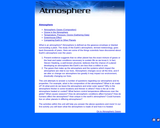
Students learn about the composition of the atmosphere and how atmospheric conditions affect humans.
- Subject:
- Earth Science
- Science
- Material Type:
- Activity/Lab
- Provider:
- ASPIRE
- Author:
- ASPIRE
- Date Added:
- 02/26/2019

Students will learn about the structure and composition of the atmosphere. Students will also track weather conditions for four days. and relate their observations to atmospheric characteristics.
- Subject:
- Earth Science
- Science
- Material Type:
- Activity/Lab
- Provider:
- Kennesaw State University
- Author:
- Chris Fox
- Date Added:
- 02/26/2019
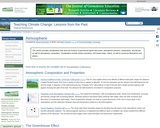
This site features Java Applet, QuickTime, and Flash animations that illustrate characteristics and functions of the atmosphere. They show how atmospheric temperature, pressure, and density change with respect to changing altitude, the way different kinds of radiation (x-ray, ultraviolet, visible, and infrared) act in various levels of the atmosphere (troposphere, stratosphere, mesosphere, and thermosphere/ionosphere), how oxygen gas and chlorofluorocarbons (CFCs) interact with ultraviolet radiation to create and deplete ozone, and the manner in which radiation is trapped in the atmosphere, causing the greenhouse effect and global warming. The animations can be paused and rewound to stress important points. These resources are suitable for use in lectures, labs, or other teaching activities.
- Subject:
- Earth Science
- Science
- Material Type:
- Reading
- Provider:
- National Association of Geoscience Teachers
- Date Added:
- 10/23/2006

In this lesson, students use Schoenbein paper to test for the presence of ozone in the air through a reaction between ozone and potassium iodide that produces a purple color.
- Subject:
- Science
- Material Type:
- Lesson Plan
- Provider:
- Smithsonian Institution
- Date Added:
- 07/02/2018

In this lesson, students will learn how scientists measure small particles called aerosols in Earth's atmosphere and make their own measurements of atmospheric aerosols.
- Subject:
- Science
- Material Type:
- Lesson Plan
- Provider:
- Smithsonian Institution
- Date Added:
- 07/02/2018

In this lesson, students create a greenhouse gas, carbon dioxide, through a simple chemical reaction, measure the effect of the gas on air temperature, and relate their findings to the greenhouse effect in our atmosphere.
- Subject:
- Science
- Material Type:
- Lesson Plan
- Provider:
- Smithsonian Institution
- Date Added:
- 07/02/2018

In this lesson, students conduct an experiment to help students understand that ultraviolet radiation is present in natural outdoor light and that the intensity of the light varies with season and time of day.
- Subject:
- Science
- Material Type:
- Lesson Plan
- Provider:
- Smithsonian Institution
- Date Added:
- 07/02/2018
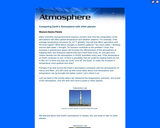
Students explore how the Earth's atmosphere compares with the atmospheres of Venus and Mars.
- Subject:
- Science
- Material Type:
- Activity/Lab
- Provider:
- ASPIRE
- Author:
- ASPIRE
- Date Added:
- 02/26/2019

In this activity, students create a model using metric measuring tapes and atmosphere composition data. Students will investigate the major components of the atmosphere (nitrogen and oxygen) as well as the minor components which raise questions about global warming and greenhouse gases.
- Subject:
- Science
- Material Type:
- Activity/Lab
- Provider:
- Exploratorium
- Date Added:
- 05/23/2017
